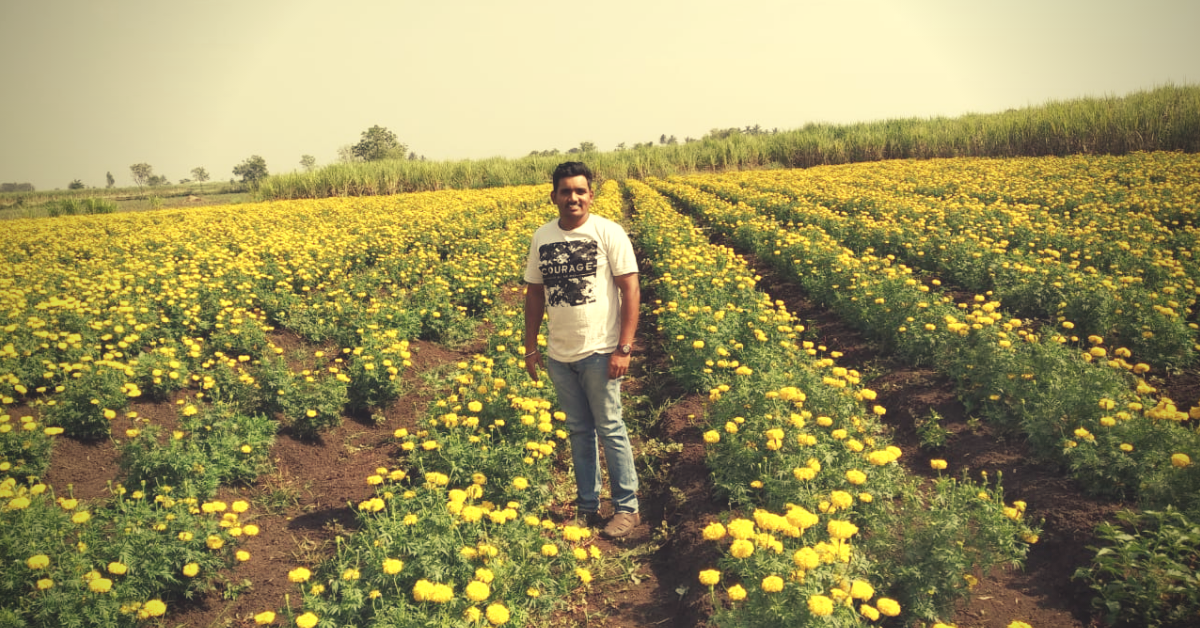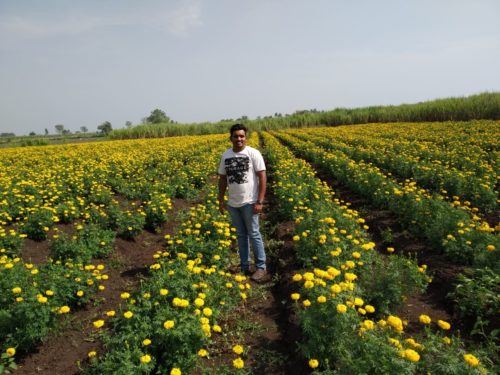As an engineer, he earned ₹6.5 Lakh. As a farmer, ₹20 Lakh!
Anup has not stopped experimenting, which according to him, is a very important factor in this field.

“You just need the courage to come out of the loop,” begins 28-year-old Anup Patil, a software engineer-turned-farmer.
Two years ago, Anup was working as an IT engineer and earning a handsome salary. But according to him, his only motivation to work for six continuous days was the ‘weekend’, and he was trapped in this loop for over four years.
So, one fine day, he wrote his resignation letter, quit his job and came back to his flat in Pune.

For the next three months, he did not tell anyone that he was unemployed. He kept visiting farmers in Gujarat, Karnataka and Maharashtra. He also utilised this time to do some market research and gather as much as information regarding farming as possible.
After three months of this, he came to his village, Nagrale, in the Sangli district of Maharashtra, with a fool-proof plan to start farming.
“I never wanted to be an employee. I could see my seniors. The calculation was very clear in my mind. You can never grow as an employee as much you can as an employer,” says Anup.
Today, Anup employs 10-15 workers at his 12-acre farm, where he grows coloured and green capsicum, sweet corn, sugarcane and marigold. Last year, his turnover was Rs 20-25 lakh, and he expects more this year.
He shares, “My package as an engineer was Rs 6.5 lakh. Here, I am earning double the money as well as satisfaction and inner peace.”

However, when he started farming in 2016, things were not that easy. People would demoralise him by saying that he had been leading a lavish life for the last decade or so, and would not be able to sustain the difficult life of a farmer.
“But you get demoralised if you are doing something that others want you to do. Here, I was doing what I wished to do,” he laughs.
Anup was determined. He began with the traditional sugarcane farming, and market research gave him the courage to do more.
He applied for a subsidy for a poly house and built one in his farm. He then started growing coloured capsicum there. Initially, he bought 7,000 plants of coloured capsicum, of which, 1,000 were destroyed. But Anup was not among those who lost hope easily and hence, he replaced those 1,000 plants. This was something no one in his village had done before. But his market strategy gained him profits in the first year itself.
“I had fixed the quantity and prices with the buyers even before I started planting the capsicum. This gave me an edge over others. Moreover, I was very particular about the quality. The fixed buyers were given only the A-grade yield, and the rest were sold in the local market. This way, the buyers never bargained for the price and also became my regular customers,” he explains.
This helped him grow confident, allowing him to experiment further. Capsicum was harvested and sold out in April, and his poly house was ready for the next crop.
This time, he had flowers in his mind. He had learnt the technique of growing chrysanths from some of the farmers in Bengaluru.
For the first 20 days, these flowers needed light all through the 24 hours. So Anup lit the poly house with LED bulbs. He worked day and night to grow them, and the crops too came out well.
But at the time, the market was down and being perishable items, the flowers could not wait. Hence, Anup had to sell them at lower rates and bear losses.
“No, I did not get disheartened. This was a lesson that it was not going to be a bed of roses. There would be profits as well as losses. I became more stubborn to go ahead,” he says.
Anup has not stopped experimenting, which according to him, is a very important factor in this field. He has now planted marigolds in four acres, selling them at the rate of Rs 50-60 per kg. He also grows sweet corn and capsicum. Additionally, he started fish farming, after learning about it on the internet.
He informs, “There was a small section in my farm where water did not drain out. I thought to utilise this drawback and turned the space into a fish pond.” He started with Catla and Cyprinus fish in this pond, made in 1.5 acres of his land. His wife, a post-graduate, also helps him at the farm now.
Sharing what worked in his favour, he concludes, “There is something to learn from everyone, even a small farmer can teach you something useful. I think that the hunger to learn has helped me become successful. I’m not shy about asking anyone anything. Moreover, agriculture is still an unexplored field. There is a huge possibility to explore and do more. I think that if more educated people take it up as a business, it will definitely flourish more than any other industry in our country.”
To know more about his farming methods, you can contact Anup Patil at [email protected]
(Edited by Shruti Singhal)
Like this story? Or have something to share?
Write to us: [email protected].
Connect with us on Facebook and Twitter.
If you found our stories insightful, informative, or even just enjoyable, we invite you to consider making a voluntary payment to support the work we do at The Better India. Your contribution helps us continue producing quality content that educates, inspires, and drives positive change.
Choose one of the payment options below for your contribution-
By paying for the stories you value, you directly contribute to sustaining our efforts focused on making a difference in the world. Together, let’s ensure that impactful stories continue to be told and shared, enriching lives and communities alike.
Thank you for your support. Here are some frequently asked questions you might find helpful to know why you are contributing?


This story made me
-
97
-
121
-
89
-
167











